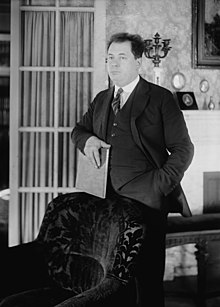Ignatz Waghalter
Ignatz Waghalter (born March 15, 1881 in Warsaw , † April 7, 1949 in New York City ) was a Polish - German composer and conductor .
Childhood and youth
Ignatz Waghalter was born in Warsaw, the 15th of 20 children to a Jewish family. Waghalter was already a virtuoso violinist and pianist as a child , and since his family was poor, he traveled to Berlin at the age of 17 to seek his fortune as a professional musician. His first teacher was Philipp Scharwenka . The famous violinist Joseph Joachim became aware of him and mediated Waghalter's acceptance into the Berlin Academy of the Arts . There he studied composition and conducting with Friedrich Gernsheim .
Waghalter's early chamber music already shows a pronounced melodic creativity, which should remain characteristic in his entire work. His early string quartet in D major, Op. 3, was highly praised by Joseph Joachim , and the Sonata for Violin and Pianoforte in F minor, Op. 5, received the prestigious Mendelssohn Prize in 1902 when the composer was only 21 years old .
Career in Germany
In 1907, under the aegis of Arthur Nikisch, Waghalter was appointed conductor at the Komische Oper Berlin , where his popularity continued to grow. This was followed by a brief position at the Grillo Theater in Essen (1911/12). He established himself as a constant in the German music scene when he became chief conductor of the new German Opera House in Berlin. The house was inaugurated on November 7, 1912 with a performance by Fidelio under Waghalter's direction.
Waghalter was very supportive of the music of Giacomo Puccini , whose operas had not yet been accepted in Germany. The German premiere of Puccini's La fanciulla del West was directed by Waghalter in March 1913 at the German Opera House. Their triumphant success was the breakthrough for Puccini's operas in Germany. Waghalter also conducted the German premieres at the German Opera House of Tosca and La Bohème as well as Ralph Vaughan Williams ' second symphony, A London Symphony, from 1913.
Three of Waghalter's own operas also premiered at the Deutsches Opernhaus : Mandragola , based on the comedy by Niccolò Machiavelli , in January 1914; Jugend , based on the naturalistic drama of the same name by Max Halbe , February 1917; and Sataniel , inspired by a Polish fairy tale, in May 1923.
Career in the United States
For the 1924-25 season, Waghalter was appointed music director of the New York Philharmonic to succeed Joseph Stransky . He turned down an offered contract extension to return to Germany. He composed some short operas and had various engagements as a guest conductor. Then Waghalter became music director of the National Opera in Riga , Latvia (1931/32). Shortly after his return to Berlin, Adolf Hitler came to power. In 1934 Waghalter had to go into exile, first to Czechoslovakia and then to Austria. There he composed his last opera, Ahasuerus and Esther (for background see Ahasuerus ). A few weeks before the " Anschluss ", Waghalter and his wife fled to the USA .
In New York , Waghalter came up with the idea of founding a classical orchestra with exclusively African-American musicians. He won the support of James Weldon Johnson and other representatives of the Harlem Renaissance , and the then so-called "American Negro Orchestra" made its first appearances in 1938 under Waghalter's direction. Johnson died that same year, and so did this project.
The melodist Waghalter did not want to go along with the development of those years towards atonality , and so he was largely forgotten when he died on April 7, 1949 at the age of 68 in New York.
His daughter Beatrice Waghalter Green (1913-2001) became a successful singer.
Reception in the present
A rediscovery of Waghalter that would be comparable to that of Erich Wolfgang Korngold or Berthold Goldschmidt is still pending. Only the opera Jugend was performed at the Deutsche Oper Berlin in 1989 ; and only one CD with Waghalter's music is available (as of June 2007). This was released in March 2006 on the US label DWG Music and contains new recordings of selected chamber music. As a conductor you can experience Waghalter on the CD Lebendige Past - Rudolf Laubenthal from Preiser Records.
Selected Works
- String quartet in D major , op.3
- Sonata for violin and pianoforte in F minor , op.5
- Rhapsody for violin and orchestra , op.9
- Concerto for violin and orchestra , op.15
- Twelve sketches for piano
- Operas
- The devil's path
- Mandragola
- Youth (Libretto: Hans Richard Weinhöppel based on the drama by Max Halbe )
- Sataniel
- Short operas: The late guest , Who owns Helena , Bärbel , Lord Tommy , Der Weiberkrieg
- several song cycles
CD
- Detroit-Windsor Chamber Ensemble: "IGNATZ WAGHALTER" (DWG MUSIC 101 [66:38 Min])
- String Quartet in D major op.3 (1901)
- Notturno for violoncello and piano op.4 (1902)
- Sonata for violin and piano in F minor op.5 (1902)
- Two pieces for violin with piano accompaniment op.14 (1908)
Autobiography
- From the ghetto to freedom . Schnurer-Verlag, Marienbad 1936.
Web links
- Official website (English)
- Detailed biography in German
- Literature by and about Ignatz Waghalter in the catalog of the German National Library
- Ignatz Waghalter archive in the archive of the Academy of Arts, Berlin
Individual evidence
| personal data | |
|---|---|
| SURNAME | Waghalter, Ignatz |
| BRIEF DESCRIPTION | Polish-German composer and conductor |
| DATE OF BIRTH | March 15, 1881 |
| PLACE OF BIRTH | Warsaw |
| DATE OF DEATH | April 7, 1949 |
| Place of death | New York City |
